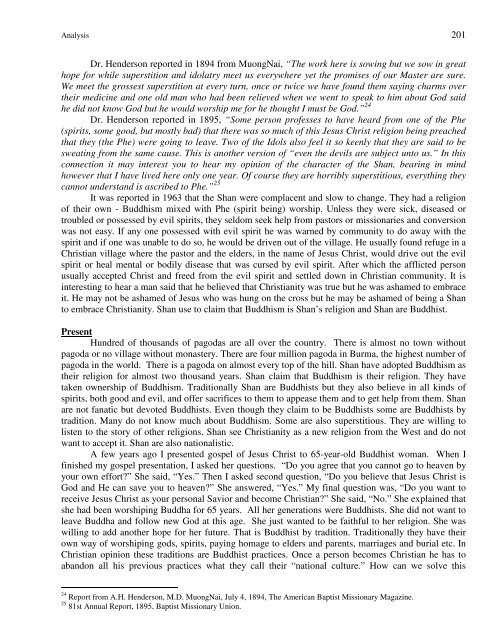History of Shan Churches in Burma 1861-2001 - Khamkoo
History of Shan Churches in Burma 1861-2001 - Khamkoo
History of Shan Churches in Burma 1861-2001 - Khamkoo
You also want an ePaper? Increase the reach of your titles
YUMPU automatically turns print PDFs into web optimized ePapers that Google loves.
Analysis 201<br />
Dr. Henderson reported <strong>in</strong> 1894 from MuongNai, “The work here is sow<strong>in</strong>g but we sow <strong>in</strong> great<br />
hope for while superstition and idolatry meet us everywhere yet the promises <strong>of</strong> our Master are sure.<br />
We meet the grossest superstition at every turn, once or twice we have found them say<strong>in</strong>g charms over<br />
their medic<strong>in</strong>e and one old man who had been relieved when we went to speak to him about God said<br />
he did not know God but he would worship me for he thought I must be God.” 24<br />
Dr. Henderson reported <strong>in</strong> 1895, “Some person pr<strong>of</strong>esses to have heard from one <strong>of</strong> the Phe<br />
(spirits, some good, but mostly bad) that there was so much <strong>of</strong> this Jesus Christ religion be<strong>in</strong>g preached<br />
that they (the Phe) were go<strong>in</strong>g to leave. Two <strong>of</strong> the Idols also feel it so keenly that they are said to be<br />
sweat<strong>in</strong>g from the same cause. This is another version <strong>of</strong> “even the devils are subject unto us.” In this<br />
connection it may <strong>in</strong>terest you to hear my op<strong>in</strong>ion <strong>of</strong> the character <strong>of</strong> the <strong>Shan</strong>, bear<strong>in</strong>g <strong>in</strong> m<strong>in</strong>d<br />
however that I have lived here only one year. Of course they are horribly superstitious, everyth<strong>in</strong>g they<br />
cannot understand is ascribed to Phe.” 25<br />
It was reported <strong>in</strong> 1963 that the <strong>Shan</strong> were complacent and slow to change. They had a religion<br />
<strong>of</strong> their own - Buddhism mixed with Phe (spirit be<strong>in</strong>g) worship. Unless they were sick, diseased or<br />
troubled or possessed by evil spirits, they seldom seek help from pastors or missionaries and conversion<br />
was not easy. If any one possessed with evil spirit he was warned by community to do away with the<br />
spirit and if one was unable to do so, he would be driven out <strong>of</strong> the village. He usually found refuge <strong>in</strong> a<br />
Christian village where the pastor and the elders, <strong>in</strong> the name <strong>of</strong> Jesus Christ, would drive out the evil<br />
spirit or heal mental or bodily disease that was cursed by evil spirit. After which the afflicted person<br />
usually accepted Christ and freed from the evil spirit and settled down <strong>in</strong> Christian community. It is<br />
<strong>in</strong>terest<strong>in</strong>g to hear a man said that he believed that Christianity was true but he was ashamed to embrace<br />
it. He may not be ashamed <strong>of</strong> Jesus who was hung on the cross but he may be ashamed <strong>of</strong> be<strong>in</strong>g a <strong>Shan</strong><br />
to embrace Christianity. <strong>Shan</strong> use to claim that Buddhism is <strong>Shan</strong>’s religion and <strong>Shan</strong> are Buddhist.<br />
Present<br />
Hundred <strong>of</strong> thousands <strong>of</strong> pagodas are all over the country. There is almost no town without<br />
pagoda or no village without monastery. There are four million pagoda <strong>in</strong> <strong>Burma</strong>, the highest number <strong>of</strong><br />
pagoda <strong>in</strong> the world. There is a pagoda on almost every top <strong>of</strong> the hill. <strong>Shan</strong> have adopted Buddhism as<br />
their religion for almost two thousand years. <strong>Shan</strong> claim that Buddhism is their religion. They have<br />
taken ownership <strong>of</strong> Buddhism. Traditionally <strong>Shan</strong> are Buddhists but they also believe <strong>in</strong> all k<strong>in</strong>ds <strong>of</strong><br />
spirits, both good and evil, and <strong>of</strong>fer sacrifices to them to appease them and to get help from them. <strong>Shan</strong><br />
are not fanatic but devoted Buddhists. Even though they claim to be Buddhists some are Buddhists by<br />
tradition. Many do not know much about Buddhism. Some are also superstitious. They are will<strong>in</strong>g to<br />
listen to the story <strong>of</strong> other religions. <strong>Shan</strong> see Christianity as a new religion from the West and do not<br />
want to accept it. <strong>Shan</strong> are also nationalistic.<br />
A few years ago I presented gospel <strong>of</strong> Jesus Christ to 65-year-old Buddhist woman. When I<br />
f<strong>in</strong>ished my gospel presentation, I asked her questions. “Do you agree that you cannot go to heaven by<br />
your own effort?” She said, “Yes.” Then I asked second question, “Do you believe that Jesus Christ is<br />
God and He can save you to heaven?” She answered, “Yes.” My f<strong>in</strong>al question was, “Do you want to<br />
receive Jesus Christ as your personal Savior and become Christian?” She said, “No.” She expla<strong>in</strong>ed that<br />
she had been worship<strong>in</strong>g Buddha for 65 years. All her generations were Buddhists. She did not want to<br />
leave Buddha and follow new God at this age. She just wanted to be faithful to her religion. She was<br />
will<strong>in</strong>g to add another hope for her future. That is Buddhist by tradition. Traditionally they have their<br />
own way <strong>of</strong> worship<strong>in</strong>g gods, spirits, pay<strong>in</strong>g homage to elders and parents, marriages and burial etc. In<br />
Christian op<strong>in</strong>ion these traditions are Buddhist practices. Once a person becomes Christian he has to<br />
abandon all his previous practices what they call their “national culture.” How can we solve this<br />
24 Report from A.H. Henderson, M.D. MuongNai, July 4, 1894, The American Baptist Missionary Magaz<strong>in</strong>e.<br />
25 81st Annual Report, 1895, Baptist Missionary Union.
















